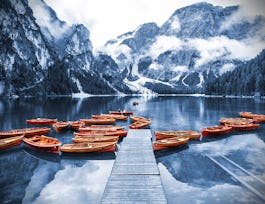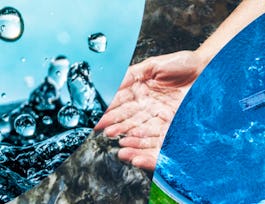In recent decades, international law has undergone a series of major developments in order to accommodate the many new facets of freshwater management and protection. The adoption of universal, regional and basin instruments highlights how important it is to study the evolution of international water regulations and to be able to identify the main principles in this field. This course aims to provide the necessary background to understand and examine the regulation applicable to transboundary freshwaters especially to rivers, lakes and aquifers. It presents the principles and legal standards that govern the use, sharing, management and protection of these resources.


International Water Law
Taught in English
23,010 already enrolled
Course
Gain insight into a topic and learn the fundamentals



Instructors: Laurence Boisson de Chazournes
(426 reviews)
Details to know

Add to your LinkedIn profile
7 quizzes
See how employees at top companies are mastering in-demand skills


Earn a career certificate
Add this credential to your LinkedIn profile, resume, or CV
Share it on social media and in your performance review

There are 5 modules in this course
With around two hundred and seventy-six (276) rivers and lakes and a large number of groundwater shared by two or more States, there is an increasing level of interest in the importance of international law in this area. This introductory module is designed to highlight how international regulation is fundamental to achieving a harmonious and peaceful management of these essential resources. It outlines the various issues and challenges related to the management and protection of water resources. Whilst emphasis is placed on the factors that can lead to conflict, the module will also show how water can be considered as an instrument of peace and cooperation among States. Within this context, the benefits of cooperation between States over transboundary freshwater are examined. We will also analyse the different uses linked to water resources and the relationships that exist between them. The module will be concluded by a quiz worth 15% of the final mark. You must have at least 80% of the answers correct to pass the module.
What's included
10 videos2 readings2 quizzes1 discussion prompt
This module outlines the major milestones in the evolution of international freshwater regulation. It will present the scope and contribution of the United Nations Convention on the Law of the Non-Navigational Uses of International Watercourses (1997 Convention) and the Convention on the Protection and Use of Transboundary Water and International Lakes of the United Nations Economic Commission for Europe (UNECE) (1992 Convention). The role of international organizations, international academic societies and civil society in the development and promotion of these instruments will be highlighted. The unique nature of groundwater regulation is also addressed and we will look closely at the main features of the 2008 International Law Commission’s Draft articles on the Law of Transboundary Aquifers. We will also examine the best practice shown in the 2008 Convention on the Protection, Utilisation, Recharge and Monitoring of the Franco-Swiss Genevois Aquifer. The module will be concluded by a quiz worth 20% of the final mark. You must have at least 80% of the answers correct to pass the module.
What's included
10 videos2 quizzes1 discussion prompt
This module presents the general principles governing how water is shared and we will also examine the rules associated with planned measures on transboundary waters. We will take a look at the theory behind the principle of equitable and reasonable use, the obligation to not cause significant harm and the principle of cooperation. The rules of notification, consultation and negotiation in the case of planned measures will be examined in detail. We will also focus how these principles interact with each other. The module will be concluded by a quiz worth 25% of the final mark. You must have at least 80% of the answers correct to pass the module.
What's included
9 videos1 quiz1 discussion prompt
This module highlights how other bodies of norms such as international environmental law, human rights and the law of climate change have contributed to the protection of transboundary freshwaters. The module presents the main international conventions that deal with the environment and details the principles that apply to the management of shared water resources (such as prevention, precaution and the obligation to conduct an environmental impact study). We will examine new legal instruments that take into account these aspects of international freshwater law via the water charters (such as for the Senegal River, the Niger River Basin, the Lake Chad Basin). The module will be concluded by a quiz worth 25% of the final mark. You must have at least 80% of the answers correct to pass the module.
What's included
8 videos1 quiz1 discussion prompt
This module presents the diplomatic and judicial mechanisms that exist for resolving water-related disputes. The essential role of basin organizations and commissions in the prevention and resolution of conflicts over water is also addressed. Finally, we examine the details of the decisions of international tribunals and courts about shared water resources and we assess their contribution to the development of international freshwater law. The module will be concluded by a quiz worth 20% of the final mark. You must have at least 80% of the answers correct to pass the module.
What's included
7 videos1 quiz1 discussion prompt
Instructors


Offered by
Recommended if you're interested in Law

University of Geneva

PepsiCo

University at Buffalo

Coursera Project Network
Why people choose Coursera for their career




Learner reviews
Showing 3 of 426
426 reviews
- 5 stars
76.52%
- 4 stars
16.43%
- 3 stars
3.28%
- 2 stars
1.17%
- 1 star
2.58%

Open new doors with Coursera Plus
Unlimited access to 7,000+ world-class courses, hands-on projects, and job-ready certificate programs - all included in your subscription
Advance your career with an online degree
Earn a degree from world-class universities - 100% online
Join over 3,400 global companies that choose Coursera for Business
Upskill your employees to excel in the digital economy
Frequently asked questions
Access to lectures and assignments depends on your type of enrollment. If you take a course in audit mode, you will be able to see most course materials for free. To access graded assignments and to earn a Certificate, you will need to purchase the Certificate experience, during or after your audit. If you don't see the audit option:
The course may not offer an audit option. You can try a Free Trial instead, or apply for Financial Aid.
The course may offer 'Full Course, No Certificate' instead. This option lets you see all course materials, submit required assessments, and get a final grade. This also means that you will not be able to purchase a Certificate experience.
When you purchase a Certificate you get access to all course materials, including graded assignments. Upon completing the course, your electronic Certificate will be added to your Accomplishments page - from there, you can print your Certificate or add it to your LinkedIn profile. If you only want to read and view the course content, you can audit the course for free.
You will be eligible for a full refund until two weeks after your payment date, or (for courses that have just launched) until two weeks after the first session of the course begins, whichever is later. You cannot receive a refund once you’ve earned a Course Certificate, even if you complete the course within the two-week refund period. See our full refund policy.



